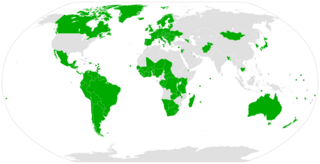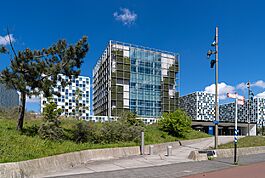International Criminal Court facts for kids
Quick facts for kids
International Criminal Court
|
|
|---|---|

Countries that are members of the International Criminal Court
|
|
| Location | The Hague, Netherlands |
| Working languages | |
| Official languages | |
| Member countries | 125 |
| Leaders | |
| Tomoko Akane | |
| Rosario Salvatore Aitala | |
| Reine Alapini-Gansou | |
| Establishment | |
|
• Rome Statute adopted
|
17 July 1998 |
|
• Started working
|
1 July 2002 |
|
Website
www.icc-cpi.int |
|
The International Criminal Court (ICC) is a special court for the whole world. It is located in The Hague, a city in the Netherlands. The court was created in 2002 by a treaty called the Rome Statute.
The ICC's main job is to investigate and hold trials for individuals accused of the most serious crimes that affect the entire international community. These crimes are genocide, crimes against humanity, war crimes, and the crime of aggression.
The ICC is known as a "court of last resort." This means it only steps in when a country's own courts are unable or unwilling to handle a case. It is meant to support national courts, not replace them. The ICC is different from the International Court of Justice, which settles disagreements between countries, not people.
As of 2025, 125 countries are members of the ICC. However, some major countries like China, India, Russia, and the United States are not members and do not accept the court's authority.
Contents
History of the Court
Why was the ICC created?
The idea for a permanent world court to judge leaders for major crimes is not new. It was first discussed after World War I. After World War II, special temporary courts were set up to try leaders from Germany and Japan for war crimes. The most famous of these were the Nuremberg Trials.
These trials showed that the world needed a permanent court to deal with such terrible events. In 1948, the newly formed United Nations agreed that a permanent court was necessary. However, because of tensions between countries during the Cold War, the idea was put on hold for many years.
Making the Court a Reality
The idea for the court was brought back in the 1990s. At the time, special UN courts were created to deal with major conflicts in the former Yugoslavia and Rwanda. These events showed again how important a permanent court would be.
Finally, in 1998, countries met in Rome, Italy, to create a treaty for the court. This treaty is called the Rome Statute. It was adopted on July 17, 1998. After 60 countries agreed to the treaty, the International Criminal Court was officially established on July 1, 2002. The first judges were sworn in the next year.
How the Court is Organized
The ICC has four main parts that work together.
- The Presidency: This is made up of three of the court's judges, including the President. They are responsible for the proper administration of the court.
- The Judicial Divisions: This group is made up of 18 judges from around the world. They are organized into chambers to hear cases and make legal decisions.
- The Office of the Prosecutor: This office is led by the Prosecutor. The Prosecutor's team investigates crimes and decides whether to bring a case to the judges.
- The Registry: This part of the court handles all the administrative tasks. This includes helping witnesses, managing the detention center, and translating documents.
How the Court Works
The ICC can only investigate crimes under certain conditions. It is designed to respect the authority of individual countries.
When Can the Court Act?
The ICC can only step in if a country's own legal system is not doing the job. This is called the principle of complementarity. The court can open an investigation in one of three ways:
- A member country asks the Prosecutor to investigate a situation within its borders.
- The United Nations Security Council asks the Prosecutor to investigate.
- The Prosecutor starts an investigation on their own, with permission from the court's judges.
The court generally only has power over crimes that happen in a member country or are committed by a person from a member country.
What Crimes Does the Court Handle?
The ICC deals with four main types of very serious crimes:
- Genocide: Acts committed with the intent to destroy, in whole or in part, a national, ethnic, racial, or religious group.
- Crimes against humanity: Widespread or systematic attacks directed against any civilian population.
- War crimes: Serious violations of the laws of war, such as targeting civilians or prisoners.
- Crime of aggression: When a country's leader plans and starts an illegal war against another country.
Challenges and Criticisms
The ICC has faced criticism since it was created. Some powerful countries that are not members, like the U.S., Russia, and China, question its authority. They worry that the court could be used for political reasons.
Some have also said the court has focused too much on leaders in Africa. This led several African countries to consider leaving the court in the 2010s. Others point out that the court can be slow, expensive, and has only had a small number of convictions. Because the ICC does not have its own police force, it must rely on member countries to arrest suspects.
Working with Other Groups
The United Nations

The ICC is an independent organization, but it has a special relationship with the United Nations (UN). The UN Security Council has the power to refer cases to the ICC, even if the country involved is not a member. The Security Council can also ask the court to delay an investigation for one year at a time.
Nongovernmental Organizations (NGOs)
Groups known as Nongovernmental Organizations, or NGOs, played a big role in creating the ICC. NGOs like Amnesty International and Human Rights Watch continue to support the court. They monitor its work, help victims, and encourage more countries to join the Rome Statute.
See also
 In Spanish: Corte Penal Internacional para niños
In Spanish: Corte Penal Internacional para niños
- Agreement on the Privileges and Immunities of the International Criminal Court
- Legal Tools (database on International Criminal Law)
- List of people indicted in the International Criminal Court
 | Lonnie Johnson |
 | Granville Woods |
 | Lewis Howard Latimer |
 | James West |



